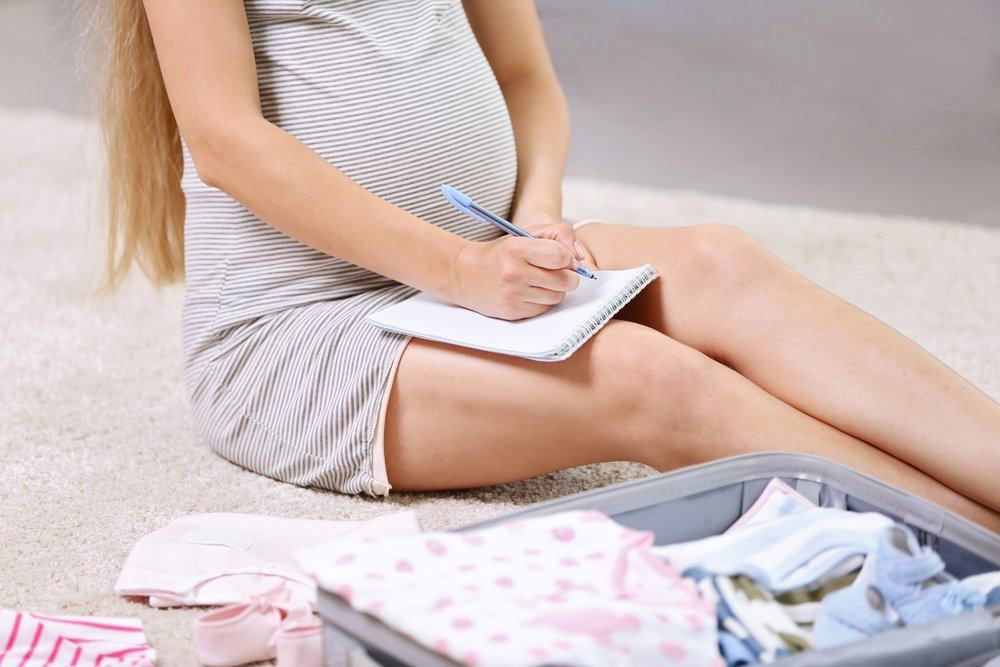Contents:
Medical Video: What's In My Hospital Bag - 37 Weeks Pregnant!
After nine months of pregnancy without a significant obstacle, you think you are just ready to face the big day you are looking forward. However, when the time goes on and before you know it, the next-door neighbor asks if you have packaged a maternity bag or registered your delivery to the hospital? And now you are panicking. Panic because it's only then that you truly realize your baby will come to the worldsoon, in a matter of weeks or even days, but your childbirth preparation is still minimal.
Childbirth preparation is more than just putting everything in your hospital bag. We collected several last-minute checklist lists to help you get ready for your little ones' arrival.
The trick, for whatever you have to do in a separate category or a series of mini homework that you can do daily. That way, you will not feel overwhelmed. Plus, remember that it's okay to bestow some tasks on your spouse or family member to help lift your weight.
What are the childbirth preparations to do?
You can check each item in this list, or just use it as a guide. Do what feels right for you.
Preparation at home
1. Pay bills and household contributions
It's trivial indeed, but it will be easy to forget about all the pay-paying business for household needs - electricity, internet, water, firstborn children, car payments, home, whatever it is! - Once your little one arrives at home. Faster is better, isn't it?
2. Monthly shopping
Again the homework seems trivial but actually it is quite important to be resolved in advance. To reduce the inconvenience that will greet you after you return home, just stock up on household supplies, from baby diapers, baby wet wipes, napkins, washcloths, bottles, formula milk, baby detergents and your regular detergent, sanitary napkins, to underwear in reserve. Other postpartum equipment recommended include: laxatives or stool softeners that are safe for the mother (ask for your obstetrician's recommendation), compresses, painkillers, gauze, donut pillows, until the food supply is fresh, dry and frozen.
3. Look for reinforcements
Recruit reinforcements for the first weeks of your baby's life. Each partner can use a helping hand from people around him while adjusting to a new life with the baby. If there are family members who are willing to help, don't reject it. Another idea: find a housekeeper to help take care of a temporary home, hire / ask for help from an adult who can be relied on to take care of your older children, or ask a midwife to do a postpartum visit. These ideas may sound like far-fetched now, but you will find that your energy savings in the first busy weeks are worth a few hundred thousand that you have to spend now.
If you have older children, make a list written for anyone who will look after them while you are in the hospital, explain their daily schedule, leave important numbers to contact and special instructions, if any.
4. Install baby seats in the car
One very important part of preparing for birth is the installation of a special baby car seat. Most hospitals will not let you check out of hospitalization if you don't have a baby seat installed in your car. If you are going to use your own car to commute to the hospital, install baby seats from now on (ask your partner or other person for help) so you have plenty of time to make sure the seat is properly installed.
Plus, make sure your car is always in full gas and ready to travel to the hospital without interruption (maybe ask your partner to do the car service from now on, just in case).
5. Babyproof your home
Make sure the baby's room is ready, clothes and baby equipment (swaddling cloth, sheets, blankets, bolster pillowcases) and your clothes and the couple are all washed and sterilized. Wash all items separately using baby-friendly soft detergent and free of perfume. You can do more detailed babyproofing, such as closing the ends of the table and socket, later when your child is more active.
In addition, take time for careful discussion with your partner about the expectations of each household assignment after the baby arrives later. Don't assume that your partner will understand how much your new baby will turn your life around. Talk about how you two will share the task of caring for babies and caring for the house. And, guide your partner about things that might be unclear, such as what he can do to support you breastfeeding later.
6. Packing maternity and after delivery bags
Prepare hospital bags from afar. Ideally when you are 8 months pregnant, because you can give birth at any time in the weeks leading up to the due date. You may want to pack two small bags to prepare for the delivery: one for the items you need during labor, and one for items for after you give birth, in the recovery room. Scroll down to see in more detail what to carry in each bag.
Preparations for the hospital
1. Register your labor
Do this from afar so that you or your partner will not be bothered with a long bureaucracy and a pile of paper terms and conditions once the first contraction starts.
Ask hospital staff about visitor policies, what you have to bring yourself from home, what you should not bring. Also ask about what items and facilities the hospital will provide for you and your baby so you don't need to carry the unnecessary ones.
Plan the route you will take for hospital admission, including where to park and which entrance to use when you check-in giving birth. You can get this logistics handle by registering a tour of the hospital or maternity clinic. During the tour, you will also learn about basic policies and visit the workforce and parenting rooms.
Finally, confirm with your doctor about when to call and go to the hospital.
2. Take a birthing preparation class
You can polish the basic principles of childbirth from the start, but it would be appropriate to practice breathing and relaxation techniques with someone who understands the topic. After all, you might have some personal questions that really need answers. There are all kinds of things about new mothers who, for whatever reason, sometimes remain taboo - urinary incontinence, baby blues, and decreased sex drive, for example.
You will not have the same experience as your friend, but finding out about certain things ahead of time can reduce the surprise factor. So asking questions must be prepared.
3. Determine who can accompany you
This is a very personal decision. Some mothers like being greeted by rooms filled with people closest to them, including their partners, midwives, one or two close friends, mother and mother-in-law to witness the miracle of the birth of a baby and provide support. (If you fall into this category, confirm with the central hospital or maternity clinic to see how many people are allowed to visit.)
Others prefer only one or two important people who attend. Think carefully about what you want, so there are no misunderstandings, uninvited guests, or those who are offended. Appointing a family "spokesperson" from the start can also help a lot - that is, someone who can send e-mails and call (or spread the news on social networking sites) the people closest to tell you the birth of your baby. Lastly, remember that childbirth is a tiring job, and visitors who keep popping up suddenly during your recovery may not make you rest calmly. If you start feeling overwhelmed, it's okay to ask the nurse to act as a "selector" of the guest.
Which must be packed in your hospital bag
If you plan to give birth at a hospital, prepare your bag at least three weeks before your due date.
1. Prepare a delivery bag
- Personal identification (KTP / SIM), insurance card, form and hospital data you need, a list of important telephone numbers that can be contacted
- Change clothes (bathrobe, negligee, sandals, socks) for you to wear during childbirth. Hospitals will usually provide hospital robes and slippers, but it's okay to bring personal reserves. Choose a negligee or pajamas that are comfortable, preferably without sleeves, or short and loose sleeves, so the nurse will easily check your blood pressure.
- Register your labor plan, if any.
- Goods for relaxation during labor (tennis balls and thick socks). This is a natural way to help relieve back pain during labor. Put a tennis ball into a sock, tie the ends, and ask your partner to roll a sock ball along your back, up and down. You can also stand leaning against the wall by tucking the bole between your back and the wall, pressing your body against the wall to help relieve tension. Or, you can bring your music player or your favorite book while waiting for labor to calm down.
2. Prepare a bag of hospitalization
- Toiletries and beauty (makeup, hair ties, skin care, toothpaste and toothbrushes, soap and shampoo, combs, nail clippers, wet wipes)
- Dress shirts (loose t-shirts, towels, washcloths, gloves, underwear, nursing bras, warm socks), sandals, and bedding (pillows or dolls).
- Mobile and charger, music player, portable DVD - if necessary
- Baby copy clothes, also your copy clothes, for checking out
- Snack
- Books and pens
Check everything you have to pack in your partner's bag here.
Finally, treat yourself before preparation for childbirth. Mani, pedi, creambath, to spa - anything that makes you feel pampered. Beautifying yourself is not your top priority for a while, so use the opportunity for one of your last baby-free sessions now.
READ ALSO:
- Kegel Gymnastics to Improve Sex Quality
- 8 Shocking Things That May Happen During Childbirth
- Diligent Pregnant Women Exercising Gives Birth to Smart Babies












